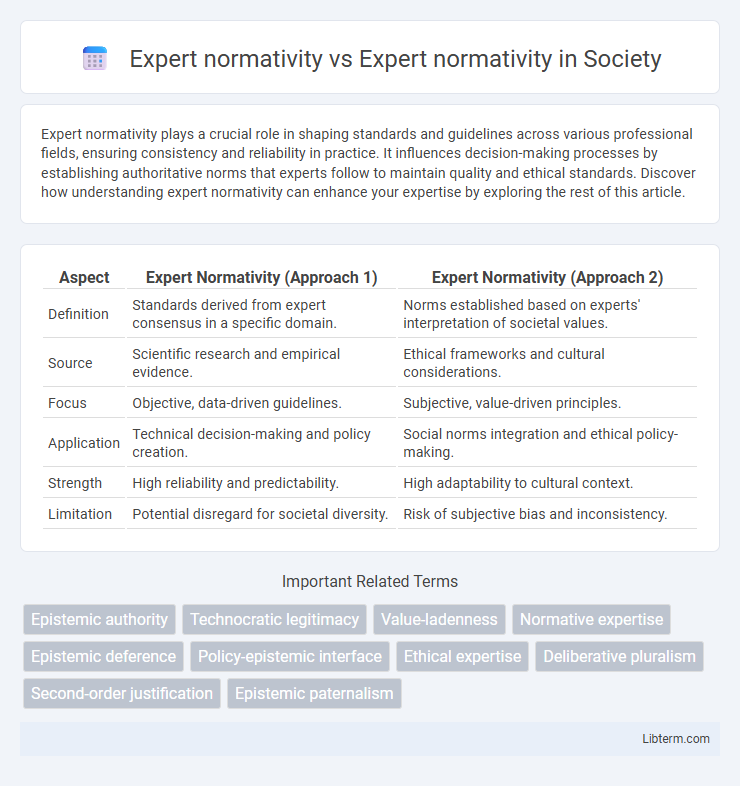Expert normativity plays a crucial role in shaping standards and guidelines across various professional fields, ensuring consistency and reliability in practice. It influences decision-making processes by establishing authoritative norms that experts follow to maintain quality and ethical standards. Discover how understanding expert normativity can enhance your expertise by exploring the rest of this article.
Table of Comparison
| Aspect | Expert Normativity (Approach 1) | Expert Normativity (Approach 2) |
|---|---|---|
| Definition | Standards derived from expert consensus in a specific domain. | Norms established based on experts' interpretation of societal values. |
| Source | Scientific research and empirical evidence. | Ethical frameworks and cultural considerations. |
| Focus | Objective, data-driven guidelines. | Subjective, value-driven principles. |
| Application | Technical decision-making and policy creation. | Social norms integration and ethical policy-making. |
| Strength | High reliability and predictability. | High adaptability to cultural context. |
| Limitation | Potential disregard for societal diversity. | Risk of subjective bias and inconsistency. |
Understanding Expert Normativity
Understanding expert normativity involves recognizing the authority experts have in guiding norms and practices within specialized fields, based on their deep knowledge and experience. Expert normativity shapes decision-making processes by establishing standards that others rely on for accuracy and legitimacy. Analyzing the dynamics between competing expert norms reveals how consensus is built and how expertise influences societal and organizational behaviors.
The Foundations of Expert Authority
Expert normativity centers on the authoritative role experts play in establishing standards and guiding decisions within specialized domains, grounded in their advanced knowledge and skills. The foundations of expert authority rely on epistemic trust, demonstrated competence, and the social recognition of expertise as essential for legitimizing their normative claims. This authority shapes normative frameworks by influencing policies, ethical guidelines, and best practices based on expert-driven evidence and reasoning.
Competing Models of Normativity in Expertise
Competing models of normativity in expertise highlight divergent views on how expert knowledge should guide decision-making and behavior. The descriptive model emphasizes how experts actually reason and apply norms based on empirical accuracy, while the prescriptive model asserts that expert norms ought to dictate ideal standards of rationality and proper conduct. Balancing these models involves reconciling the factual practices of experts with normative claims about how expertise should be used to justify actions.
Epistemic vs Practical Normativity among Experts
Expert normativity in epistemic contexts governs the standards for knowledge acquisition, justification, and belief formation, emphasizing accuracy and truthfulness in expert judgments. Practical normativity among experts relates to decision-making standards that guide actions based on expertise, balancing risks, benefits, and ethical considerations in applied settings. Differentiating epistemic from practical normativity clarifies how epistemic justification underpins belief states, while practical directives shape effective and responsible expert interventions.
The Role of Consensus in Expert Normativity
Consensus plays a pivotal role in expert normativity by establishing shared standards and criteria that guide expert judgment and decision-making processes. This collective agreement enhances the reliability and legitimacy of expert opinions, ensuring consistency across disciplines and reducing individual bias. Recognizing the importance of consensus helps differentiate between subjective expert views and normatively binding expert advice, promoting trust in expert-driven norms.
Challenges in Defining Expert Normative Standards
Defining expert normative standards involves challenges such as subjective interpretations of expertise, variability across disciplines, and evolving knowledge bases that complicate consensus on benchmarks. Discrepancies in establishing criteria for competence and credibility highlight tensions between rigid frameworks and context-sensitive judgments. Balancing consistent, measurable standards with flexibility to accommodate diverse expert roles remains critical for effective normativity.
Disagreements and Pluralism within Expert Communities
Disagreements within expert normativity highlight the challenges of establishing universal standards due to divergent interpretative frameworks and methodological approaches among specialized professionals. Expert pluralism acknowledges these variances, promoting a landscape where multiple normative perspectives coexist and contribute to richer, more robust knowledge production. This pluralistic stance fosters critical dialogue and adaptive problem-solving, enhancing the legitimacy and resilience of expert consensus in complex policy and scientific domains.
The Impact of Social Context on Expert Normativity
Expert normativity is profoundly shaped by the social context in which experts operate, influencing how their judgments and standards are formed and accepted. Variations in cultural, institutional, and interpersonal environments affect the credibility attributed to expert opinions and the norms they establish within their fields. Consequently, understanding expert normativity requires analyzing the dynamic interplay between expert knowledge and the social frameworks that validate or challenge it.
Navigating Conflicts between Competing Expert Normativities
Navigating conflicts between competing expert normativities requires a nuanced understanding of domain-specific standards and methodological principles guiding each expert community. Prioritizing transparency in the criteria used for normativity helps reconcile divergent expert judgments and facilitates consensus-building in interdisciplinary contexts. Effective conflict resolution also depends on establishing clear frameworks that recognize the epistemic authority and normative commitments unique to each expert group.
Future Directions in Research on Expert Normativity
Future research on expert normativity emphasizes exploring the dynamics between epistemic authority and social influence in decision-making processes. Investigations aim to clarify the normative boundaries that define expert credibility, incorporating interdisciplinary approaches from philosophy, cognitive science, and sociology. Emerging studies also prioritize the impact of technological advancements, such as AI-driven expertise, on evolving standards of expert normativity.
Expert normativity Infographic

 libterm.com
libterm.com